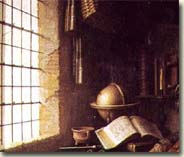Ye Ratte & ye Pelicane
The proverb Suo ipsius indicio periit sorex quoted yesterday inspired us to look up its English translation, published by Richard Taverner in his Adages of 1545, which is entirely included in our Erasmus CD. And we found it really worth to share with our Readers.
The ratte dyeth by vttering of her selfe. This prouerbe toke ye begynning of ye propertie of this vermyn for the rattes be wonte to make a noyse moch more than mise do, & do more rumble about & make a noysom cryeng while they knawe candelles endes or such other trifelles to whiche noise manymen harkening forth with though it be in ye darke night throwe at them and so kyll them. Semblably manye men & women there be which by their owne noyse and bewrayeng of them selfes, seke theyr owne bande and destruction.
This beautiful text recalls us a set of apocryphal “Renaissance” translations of Erasmus’ Adages, composed by the eminent Classical font designers Mindaugas Strockis and Ralph Hancock on the basis of the Latin original published in our CD. Here you are one of them, the translation of the adage Thessalorum alae. We are sure you will enjoy it as much as we did.
The winges of ye Thessalians: a Gifte that becomes a burden. Hesiod hath wrytten, that in ye flood of Deucalion, when all of Grece was drowned, the Thessalians alone saved themselues by the aid of Alphenor a magician who transformed them into Pelicanes. After the floode was abated, Alphenor beyng him selfe a pelicane, coulde not undo the spelle and alle remayned as birdes. Whence to this day some calle pelicans, Thessalianes.
The ratte dyeth by vttering of her selfe. This prouerbe toke ye begynning of ye propertie of this vermyn for the rattes be wonte to make a noyse moch more than mise do, & do more rumble about & make a noysom cryeng while they knawe candelles endes or such other trifelles to whiche noise manymen harkening forth with though it be in ye darke night throwe at them and so kyll them. Semblably manye men & women there be which by their owne noyse and bewrayeng of them selfes, seke theyr owne bande and destruction.
This beautiful text recalls us a set of apocryphal “Renaissance” translations of Erasmus’ Adages, composed by the eminent Classical font designers Mindaugas Strockis and Ralph Hancock on the basis of the Latin original published in our CD. Here you are one of them, the translation of the adage Thessalorum alae. We are sure you will enjoy it as much as we did.
The winges of ye Thessalians: a Gifte that becomes a burden. Hesiod hath wrytten, that in ye flood of Deucalion, when all of Grece was drowned, the Thessalians alone saved themselues by the aid of Alphenor a magician who transformed them into Pelicanes. After the floode was abated, Alphenor beyng him selfe a pelicane, coulde not undo the spelle and alle remayned as birdes. Whence to this day some calle pelicans, Thessalianes.



0 Comentarios:
Publicar un comentario en la entrada
<< Home